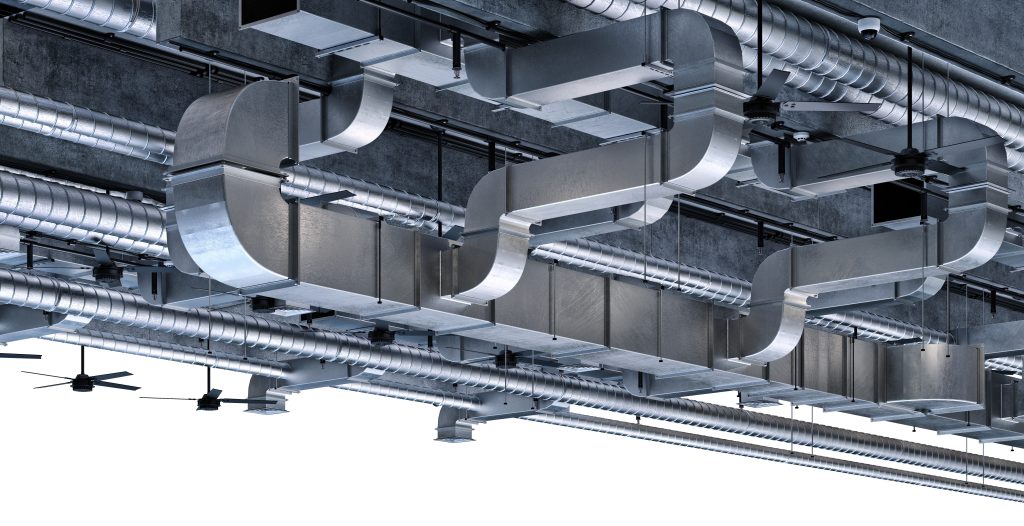
Why are air cleaners needed when there is a ventilation system in place?
We have a ventilation system in place that works well, is that sufficient for good indoor air? Why do we need an air cleaning solution when we have ventilation? What is the difference between ventilation and air cleaning?
These are very common questions we recieve when speaking about indoor climate. And they don’t have one straight answer. It depends on various circumstances. Let’s break down some of the differences and explain why investing in an air cleaning solution can pay off.
There are many air-related problems that can affect the business and the people who work there, e.g. dust, mold and toxic gases. Indoor air pollution comes from, among other things, people, processes, the outdoor air and from the building itself.
Mold is a common reason businesses are forced to close. Through a simple Google search, you will quickly find new articles about cases where mold made the staff sick. Mold spores are everywhere around us but grow and multiply in moist environments, problems with mold therefore often arise in connection with moisture damage and inadequate ventilation.
Ventilation systems that are not fully functional or efficient enough for the business are very common, especially in older properties, such as premises for schools, hospitals, childcare and elderly care. In Sweden, mandatory ventilation control according to the Act on OVK, exists to ensure a good indoor climate and a functioning ventilation system. Similar regulations exist in most countries.
Unfortunately, lack of time and poor planning lead to many checks being carried out carelessly or far too late, when the damage is already done.
Even though a control of the ventilation has been carried out and been approved, it is not proof of good and healthy air quality. The control focuses on the requirements that applied when the ventilation was put into operation and does not take into account the business today, the activity that takes place in the premises and how the people staying there feel. Air quality can vary greatly depending on the premises’ characteristics and activity, but unfortunately air measurements and control of indoor particle levels are not yet standard. The particles can be anything from airborne viruses and bacteria to mold spores, pollen, hair, dust, debris and other common air pollutants.
Unfortunately, many business managers and business leaders realize far too late what damage can occur when the air has not been controlled. If it has gone too far, as is often the case with mold, it can lead to the business having to close for extensive renovations and those who stayed in the premises have been exposed to major health risks, which in the worst case can lead to illness and a legal issues.
Ventilation and air cleaning, what’s the difference?
The simple answer is that air cleaning is a complement to the existing ventilation system. Indoor air is a mixture of incoming outdoor air (via the ventilation) and the particles and gases generated inside the premises. The ventilation is the building’s breathing function and mainly handles the air that comes from outside. It is limited to certain particle sizes and does not filter the pollutants generated inside the building. If you suspect that your business or the people staying in your premises are negatively affected by the air quality, an air measurement should be carried out, to investigate whether there is a need for air cleaning.
Approved ventilation is the basis for healthy indoor air – air cleaning is a complement where there is an increased need to clean the air.
Freestanding air purifiers for indoor environments filter particles and gases in the room and then allow the clean air to return to the same environment. Air cleaners filter the air that is already in the room and do not bring in new air from outside. Another big difference to ventilation is that air cleaners can have several layers of filters, where the filter combination is adapted to capture particles of a specific size or type, with e.g. HEPA or carbon filter. This makes it possible to tailor the air cleaning solution according to the needs that exist. There are also air cleaners that are specially designed for toxic gases that conventional ventilation cannot handle, such as cigarette smoke.
Service & Guarantee
Regardless of the air cleaning solution and technology used, it is important to remember that all air cleaners decrease in efficiency if they are not maintained regularly. Either the filters become full and need to be replaced with new ones or they need to be cleaned. It is extremely important that this is monitored and done regularly, otherwise you have an air cleaner that costs money but does not work and may even make the air problem worse.
Which air cleaner should you choose?
Which air cleaner is best suited depends on the needs of the business i.e. what kind of particles or gases are present, the size of the premises, what activities that takes place in the premises etc. Do your research and get help from an expert before you choose.
Take one step closer to clean air
We are happy to support you on the journey toward a healthy, safe, and productive work environment. Welcome to contact us for a free consultation.

